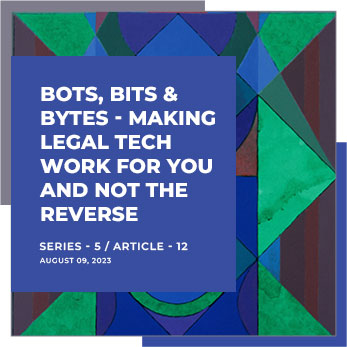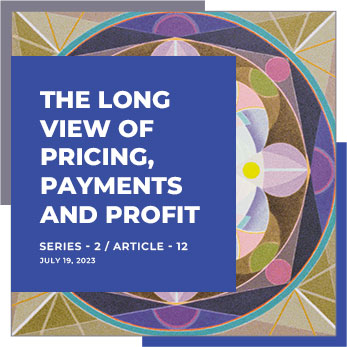“In a crisis, when the stakes are high, and scrutiny is intense, the board has a unique role. Stepping in may be uncomfortable, but stepping aside is not an option.”
The ‘Great Recession’ which officially ran from December 2007 until June 2009, was considered the worst U.S. (and global) economic downturn since the Great Depression. Yet, what came out of that episode were important lessons to be learned ‘for the next time.’ That next time came sooner than expected with the severe downturn that arose out of the COVID-19 pandemic and its resultant ‘Great Lockdown’ disrupting the supply chain, creating raw material shortages, and presenting unprecedented implications for the workforce and the workplace.
Clearly, new models for corporate governance and risk management suddenly became necessary in order to weather the crisis. For corporate stakeholders, the learning curve for those models had to be a short one so as to be able to reduce corporate distress and minimize their own liability.
Maintaining Trust
The global financial crisis of late 2007 and into 2009 brought corporate governance issues under the lens of public policymakers, regulators, politicians, and investors. The critical role of corporate governance in ensuring an optimized, stable economic system while maintaining the trust of investors and other capital markets principals was brought to the fore with an eye towards preventing any future financial crashes.
Experts, ranging from Wall Street pundits to academic experts, economic advisors, and political consultants, all were in agreement that sound corporate governance would require more well-refined mechanisms operating under tighter regulatory controls. But regardless of whether adopted pursuant to regulatory mandate or simply due to common sense internal control protocols, an almost seismic change had come to the previously held notions of corporate governance and the management of risk.
Remuneration Disclosure
One change that has had a positive effect on executive compensation disclosure is the SEC’s Compensation Discussion and Analysis (CD&A) regulations that require a committee comprised solely of independent directors to prepare a Compensation Committee Report signed by each member confirming that the compensation committee reviewed the CD&A with management. The CD&A then becomes part of the annual report. The regulations also require that the role of compensation consultants in the compensation process be disclosed and that perks, including pension and deferred compensation benefits, be transparent.
A 2009 study found that the tightened regulations resulted in the disclosure of significantly larger amounts of perks to executives, and a number of firms that had abnormally high CEO compensation prior to the new rules reduced or eliminated perquisite programs following the new rules.
Strengthening Boards
As a result of the stresses imposed by the COVID-19 pandemic, companies looked at ways to strengthen their boards in the face of difficult economic times. One course of action has been to freshen their boards with new leadership possessing new areas of expertise—particularly in fields that are relevant to the company’s products and operations— who will bring along fresh perspectives. Board complacency and staleness were contributing factors to inefficient responses to the previous crises.
The addition of more non-executive directors, those who are not involved in the day-to-day management of the company’s business, is another positive response intended to strengthen boards. Such directors, being independent, hold no interest or relationship that might unduly influence policy or cause bias in decision-making. The tenure of directors is also being capped, with the argument being that long-serving directors are so enmeshed with the company that they tend to lose any sort of outside perspective. Accordingly, pressure has come to be exerted on long-serving directors to resign.
Regular Evaluation
Overall performance evaluation is being stepped up as to the performance of the board as a whole, as well as its committees, individual directors, and even the chairperson of the board. Such evaluations are to be undertaken annually, with the intention that companies will, in fact, reflect on the outcomes, and take any necessary remedial actions accordingly. For example, those lacking proper governance skills should be offered mentoring or attend training in order to beef up the skills necessary to run the company. All board members should also participate in regular ‘continuing education’ so as to keep abreast of rapidly changing laws and regulations affecting not only their managerial obligations but also the regulations affecting their industry.
Key Elements of Crisis Response
Although calls for corporate governance reform were initially levied against financial institutions in the wake of the Great Recession, the principles invoked have since been applied to non-financial corporate governance standards as well. Reform advocates have identified the specific areas of corporate governance requiring reform as: (a) the strengthening of board oversight over management, b) positioning risk management as a key board responsibility, and; c) encouraging remuneration practices that balance risk and long-term performance criteria.
However, behind all talk of board governance reform lies the concept of shareholder activism: Situations of weak shareholder rights have been shown to limit the ability of shareholders to hold boards to account, while greater regulation improving shareholder rights can boost the mechanisms by which shareholders can bring influence to bear upon corporate governance.
Internal Work, External Focus
The pressure on an organization to address and resolve a crisis can be overwhelming if the organization is ill-equipped to manage it. A professional crisis response combines swiftly fixing what went wrong while at the same time remaining externally focused with strong communication between the board, shareholders, and regulators. It is through the conduct of a well-constituted and governance-reformed board that crises can be managed so as to maintain and strengthen the future of the organization.
Executive Summary
The Issue
How directors can navigate the crises of economic downturns and keep their organizations on the right course.
The Gravamen
Corporate governance reform, including board strengthening and stakeholder involvement, is key to overcoming adverse financial and other economic crises.
The Path Forward
Sound corporate crisis governance will require well-refined mechanisms operating under tighter regulatory controls, coupled with enhanced shareholder rights.
Action Items
Board Constitution:
Review the makeup of your board with regard to the quality of governance expertise, percentage of independent directors, and tenure of directors.
Board Evaluation:
Put in place a policy of annual evaluation that applies to the board as a whole, its committees, individual directors, and the chairperson.
Remuneration Review:
A Compensation Committee Report must be a part of the annual report and disclose executive compensation and perquisites in a transparent manner, along with disclosures as to the role of compensation consultants.
Shareholder Rights:
In order to hold the board accountable, shareholders must be able to exercise their rights as the primary stakeholders having a say in the corporate governance areas of risk management and executive compensation.
Further Readings
- https://theconversation.com/4-ways-companies-can-strengthen-their-boards-to-make-it-through-tough-economic-times-192255
- https://www.nacdonline.org/insights/publications.cfm?ItemNumber=68350
- https://www.oecd.org/daf/ca/corporategovernanceprinciples/corporate-governanceandthefinancialcrisis.htm
- https://www.emerald.com/insight/content/doi/10.1108/CG-02-2018-0080/full/html
- https://link.springer.com/article/10.1007/s10997-017-9379-3







